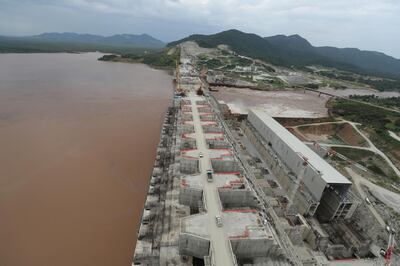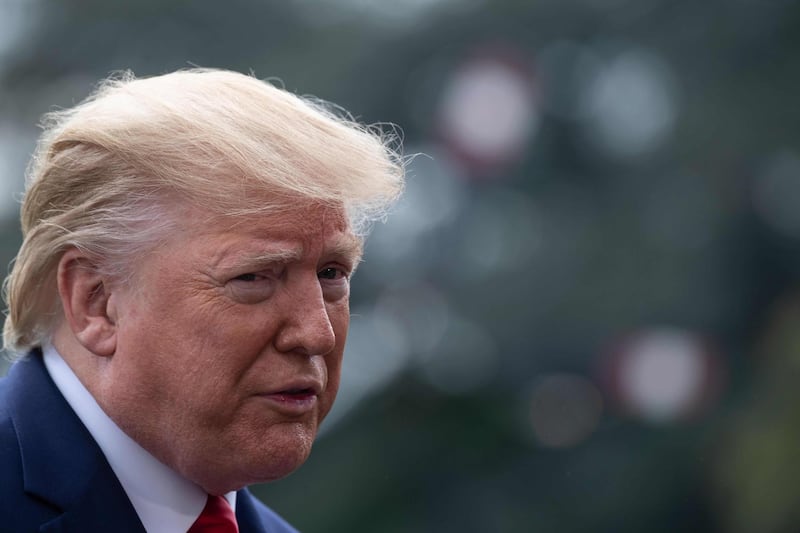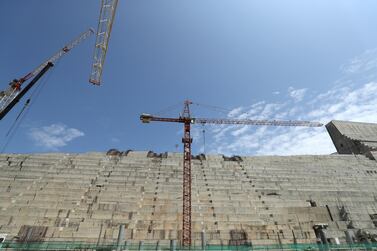A first meeting by the US government to mediate the dispute between Egypt, Ethiopia and Sudan ended on Wednesday with no breakthrough but it "went well,” US President Donald Trump announced on Twitter.
Foreign ministers from Egypt, Sudan and Ethiopia – Sameh Shoukry, Asma Abdallah and Gedu Andargachew – met Mr Trump, US Treasury Secretary Steve Mnuchin and a representative from the World Bank at the White House on Wednesday.
They were trying to resolve the dispute over the Grand Ethiopian Renaissance Dam, or Gerd, which Egypt says will rob it of a crucial water supply.
Mr Trump tweeted a photo of himself with the representatives behind the Resolute Desk.
“Just had a meeting with top representatives from Egypt, Ethiopia, and Sudan to help solve their long-running dispute on the Grand Ethiopian Renaissance Dam, one of the largest in the world, currently being built,” Mr Trump posted on Twitter.
“The meeting went well and discussions will continue during the day.”
The Treasury Department set two more meetings and a deadline of mid-January for an agreement.
In a joint statement released by Treasury, the ministers reaffirmed their commitment “to reach a comprehensive, co-operative, adaptive, sustainable and mutually beneficial agreement on the filling and operation” of the dam.
It said they agreed “to hold four technical government meetings at the level of water minister” by January 15, 2020, to fulfil an agreement.
They also agreed on meetings in Washington on December 9 and January 13, 2020 to assess and support progress.
If no such agreement were reached, the statement said “the foreign ministers agree that Article 10 of the 2015 Declaration of Principles will be invoked”, which would bring in outside mediation for the issue.
The dam is a $4 billion (Dh14.7bn) project by Ethiopia announced in 2011 being built on the Blue Nile, which accounts for about 85 per cent of the Nile water.
Egypt says the dam will worsen its water crisis and pose a threat to its economy.
Egyptian President Abdel Fattah El Sisi has welcomed US mediation and praised Mr Trump’s efforts, calling him “a unique man who possesses the strength to face and deal with crisis".
Mr Trump’s adviser and son-in-law, Jared Kushner, also attended the talks and held a meeting with Mr Shoukry on Tuesday, Egyptian media reported.
But a breakthrough was not achieved on Wednesday and experts see a number of disagreements ahead.
Michele Dunne, a director and senior fellow at the Carnegie Endowment for International Peace, saw a quick fix as unlikely.
"Egypt and Ethiopia have been arguing about the dam for years now," Ms Dunne told The National.
"There have been dozens of rounds of failed diplomacy and a quick fix seems unlikely.
“That being said, anything that can stave off threats of military action or covert competition in the Horn of Africa is welcome.”
Egypt has threatened military action if all else fails.
Ms Dunne said the next natural step “would be talks between technical experts, perhaps with US and World Bank mediators present".
But she considered it to be essential that Egypt also adopt serious water-conservation measures.
“Egypt has been behaving like a country with plentiful fresh water for many years, while in fact it has entered an era of water scarcity for many reasons including rapid population growth and climate change, as well as the Gerd,” Ms Dunne said.

Michael Hanna, a senior fellow at The Century Foundation, pointed to differences among the parties even in how they interpret the Washington meeting.
"Egypt is eager to portray the meetings as US-mediated talks, while Ethiopia has downplayed that possibility, suggesting simply that the United States is serving as a host for the parties to discuss the issues," Mr Hanna told The National.
“Egypt has very little leverage after neglecting sub-Saharan Africa for years and ignoring developments in Ethiopia.”
He said that while Egypt had valid concerns as a result of its extreme dependence on the Nile, “Ethiopia has not been sympathetic to Egypt’s demands or open to US or other third-party mediation.”
Mr Hanna said chances of a deal at this point were low, as it would “require a major shift on the part of Ethiopia”.






